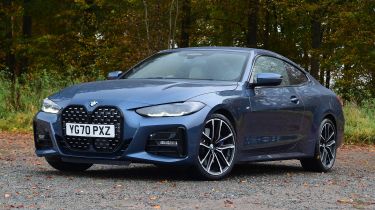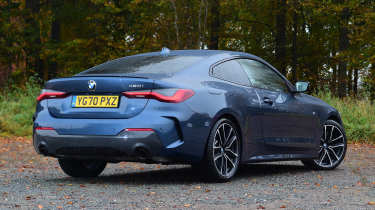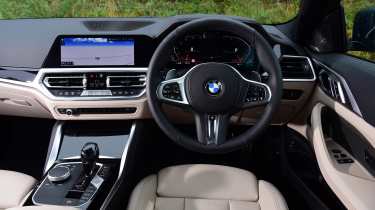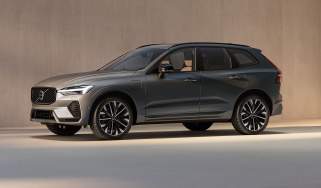Used BMW 4 Series (Mk2, 2020-date) review: expensive exec oozes class
A full used buyer's guide on the BMW 4 Series covering the 4 Series Mk4 that's been on sale since 2020
Verdict
We could say that the BMW 4 Series is as good to drive as it is to look at, but we suspect that might not inspire you to even consider one. If you try one out, though, you’ll soon discover that this is a car that’s very much function over form. And if nothing else, it’ll create a talking point with your friends. For many years the BMW 3 Series has been one of the most complete cars on the market, and these two-door models are a 3 Series in everything but name, which tells you all you need to know about what they offer in terms of usability, dynamic abilities, performance and safety. Being a BMW, there are no bargains to be had when buying used, but think of the 4 Series as reassuringly expensive.
For a long time now, BMW has offered a wide model range, with many of its cars class leaders when it comes to efficiency, build quality and dynamic ability. There was a time when the firm’s vehicles were also graceful and stylish,
but in recent years the brand has moved towards designs that are more divisive, and the 4 Series is just such a car.
Used - available now

2025 BMW
4 Series
15,531 milesAutomaticPetrol3.0L
Cash £37,600
2021 BMW
4 Series
38,907 milesAutomaticPetrol2.0L
Cash £26,800
2023 BMW
4 Series
76,602 milesAutomaticDiesel2.0L
Cash £20,700
2020 BMW
4 Series
60,000 milesAutomaticDiesel3.0L
Cash £18,975The looks alone prevent the 4 Series from being added to the shortlist of many potential buyers, but if you can get on with its overly flared nostrils, there’s a lot to love about this impressive GT. The BMW 4 Series is available in three forms: a coupé and convertible that both come with two doors, and a four-door Gran Coupé, which we’ll cover in another issue.
History
The Mk2 4 Series coupé, codenamed G22 by BMW, was launched in October 2020 with three petrol engines: the 181bhp, 2.0-litre 420i, 254bhp, 2.0-litre 430i and the 369bhp, 3.0-litre M440i xDrive. Initially there was just one diesel, a 187bhp, 2.0-litre 420d, but by March 2021 there were also 282bhp, 3.0-litre 430d and 335bhp, 3.0-litre 440d xDrive options.
In March 2021 the second-generation 4 Series convertible arrived, with the same engine options as the coupé, and at the same time the 503bhp Mk2 M4 coupé was launched, followed two months later by the M4 convertible. A facelifted 4 Series has just reached showrooms, with an updated interior and exterior design, a refreshed instrument panel and a new operating system for the iDrive infotainment.
Which one should I buy?
The three key decisions you have to make are whether you want a convertible or a coupé, how much performance you need (the four-cylinder engines should be sufficient for most), and if you want a petrol or diesel engine. There are no wrong decisions because any 4 Series is great to drive, easy to live with and has plenty of performance with reasonable economy.
The four-cylinder engines are all you really need, but the six-cylinder models are especially sublime to drive, although they’ll cost you more for fuel, insurance and maintenance, as you’d expect.
BMW offered M Sport and M Sport Pro trims, with the former featuring 18-inch alloy wheels, three-zone climate control, LED headlights, variable steering, front and rear parking sensors, digital dials, a 10.25-inch touchscreen and adaptive cruise control. The Pro edition added 19-inch wheels, metallic paint, adaptive suspension and an upgraded hi-fi.
Alternatives to the BMW 4 Series
The two most obvious competitors are German, and they are the Audi A5 and the Mercedes C-Class. Both came in coupé or convertible forms, but while the Audi has a wonderful interior, some great engines and packs plenty of tech, it’s nowhere near as much fun to drive as the BMW. The Mercedes is more rewarding to drive and, like the others, has plenty of kit, some great engines and feels special inside.
Another readily available rival is the Ford Mustang, which also comes in open or closed guises. While there are no diesel engines, the turbocharged 2.3-litre petrol unit is punchy, plus the 5.0-litre V8 sounds superb and provides plenty of pace. A less obvious choice is the Lexus RC, which is much rarer and less engaging dynamically, but is refined and very eye-catching.
What to look for
Hybrid tech
To improve efficiency, all of the diesel engines and the M440i xDrive come with mild- hybrid tech, which also adds 10bhp.
iDrive niggles
The iDrive infotainment can be a bit glitchy with some phones. Updating your car and/or phone software usually fixes things.
Ride
All 4 Series come with either 18-inch or 19-inch wheels. When these are combined with the sport suspension, check that you can live with the firm ride.
Get a grip
The 4 Series is rear-wheel drive, but xDrive editions have four-wheel drive. It’s worth having with any engine, for year-round security.
Interior
As you’d expect, the view for a 4 Series driver is very much like that for someone in a 3 Series. That means a dash that’s really easy to live with once you’ve mastered it, along with some of the comfiest and most supportive seats around.
The cabin is also filled with high-quality materials, and the front seats are wonderfully comfortable and supportive. Unlike in the 3 Series, headroom is at a premium for those in the back, although legroom is a bit more generous and there’s a decent amount of cubbyholes. Boot space is okay, at 440 litres, and to boost usability, the rear-seat backrest folds down, although BMW doesn’t quote a cargo volume for this mode.
Prices
There are three times as many coupés as convertibles for sale on the used market, and almost one in three 4 Series is a diesel. About one third of 4 Series examples have a 3.0-litre six-cylinder engine and to bag one of these, you’ll need to splash the cash.
Running costs
The 4 Series comes with variable servicing, which tells the driver when maintenance is required, based on oil levels, wear rates of individual components, and how hard the vehicle is driven. With normal driving, an oil service is due every 16,000 miles or so.
Because parts are replaced when necessary rather than according to a set schedule, there are no fixed prices, but expect to pay £330-£375 for an oil and filter change. Replace the air and fuel filters as well and this cost jumps to £590-£630, while fresh brake fluid is required after three years and then every other year, at £80 a time. Lifetime coolant is used and no 4 Series engine has a cambelt to replace.
Recalls
BMW has recalled the second-generation 4 Series on just two occasions so far, and in both cases the campaigns also affected a variety of other models in the manufacturer’s range. The first was issued in March 2021 and affected 705 cars made in January and February 2021. Some 3, 4, 5, 7 and 8 Series examples, as well as the Z4, left the factory with sub-standard brake discs; replacements were fitted by dealers.
The second recall came in August 2022 and it affected more than 320,000 BMWs produced between October 2020 and June 2021. Apart from the Z4, pretty much every model in the marque’s range was affected by a faulty Exhaust Gas Recirculation (EGR) system that could lead to a fire in the engine’s intake manifold. To check if any BMW that you’re thinking of buying is subject to an outstanding recall, put its VIN into bmw.co.uk/en/footer/quick-links/bmw-vehicle-recalls.html.
Driver Power owner satisfaction
BMW rarely does really well in our New Car surveys. In 2023 there were four models in the top 75; the i3 came 13th but the 1, 3 and 5 Series came 72nd, 46th and 47th respectively. There were six BMWs in the 2022 survey, placed between 32nd and 74th. The 4 Series is too niche to appear, but the 3 Series usually does; it came 46th in 2023, with the only high scores being for ergonomics and fuel economy.










